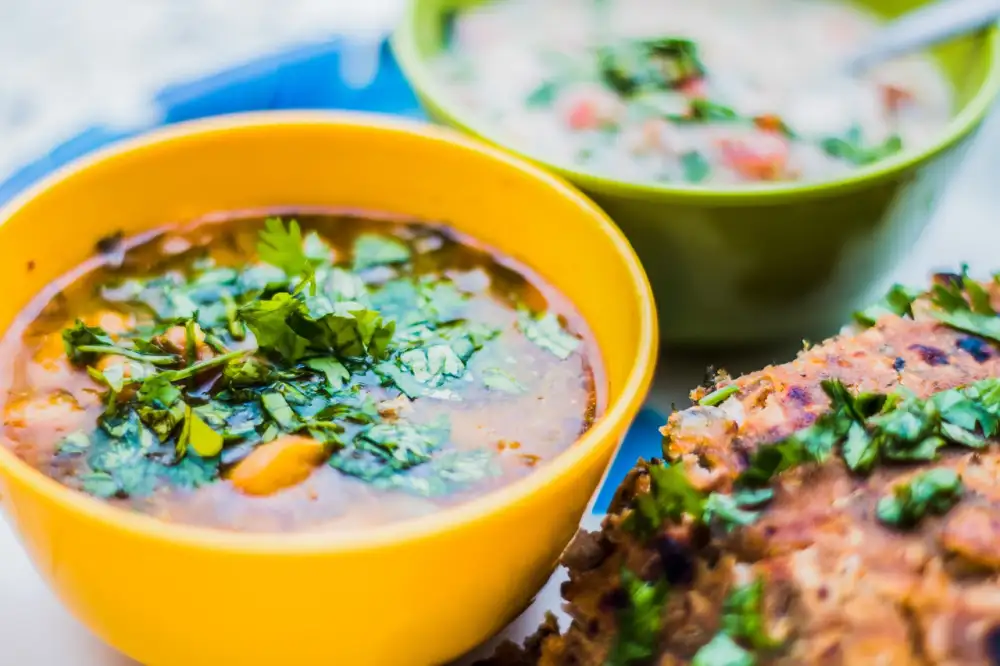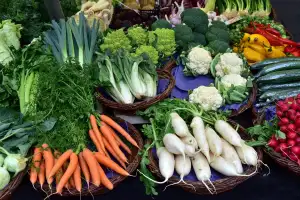Delicious Vegetarian Curry Recipes to Satisfy Your Cravings

**Introduction to Vegetarian Curry**
Curry, a popular dish originating from the Indian subcontinent, has gained worldwide recognition for its rich and aromatic flavors. Vegetarian curry, a variation of this beloved dish, offers a delightful array of vegetables and spices cooked in a flavorful sauce. Known for its versatility and ability to cater to various dietary preferences, vegetarian curry is a favorite among both vegetarians and non-vegetarians alike. Whether you're a seasoned chef or new to the world of cooking, vegetarian curry is a delicious and satisfying option that can be easily customized to suit your taste preferences.
Health Benefits of Vegetarian Curry
When it comes to health benefits, vegetarian curry is a powerhouse of nutrients. Packed with vegetables, legumes, and spices, it provides a wide array of vitamins, minerals, and antioxidants essential for overall well-being. The combination of ingredients in vegetarian curry can help reduce inflammation, improve digestion, boost immunity, and promote heart health. Additionally, the high fiber content in vegetables and legumes can aid in weight management and support healthy blood sugar levels. By incorporating vegetarian curry into your diet, you can enjoy a delicious meal while reaping the numerous health benefits it has to offer.
Common Ingredients in Vegetarian Curry
Vegetarian curries are known for their rich and flavorful profiles, achieved through a blend of aromatic spices and fresh ingredients. Some common ingredients found in vegetarian curry recipes include onions, garlic, ginger, tomatoes, coconut milk, various vegetables like potatoes, carrots, bell peppers, and peas. The key spices that give curry its distinctive taste are turmeric, cumin, coriander, garam masala, and chili powder. Lentils or chickpeas are often added to provide protein and texture to the dish. These ingredients come together harmoniously to create a satisfying and nutritious meal that is loved by many around the world.
Step-by-Step Recipe for Making Vegetarian Curry
1. Heat oil in a pan and sauté onions, garlic, and ginger until fragrant.
2. Add your choice of vegetables like bell peppers, carrots, and potatoes to the pan.
3. Sprinkle curry powder, turmeric, cumin, and coriander over the vegetables.
4. Pour in coconut milk or vegetable broth to create a flavorful base.
5. Simmer the mixture until the vegetables are tender.
6. Add cooked chickpeas or tofu for protein.
7. Season with salt and pepper to taste.
8. Garnish with fresh cilantro before serving over steamed rice or with naan bread.
Enjoy this aromatic and satisfying vegetarian curry packed with flavors!
Variations and Customizations of Vegetarian Curry
Vegetarian curry offers a wide range of possibilities for customization to suit individual preferences. You can experiment with different vegetables such as bell peppers, sweet potatoes, or eggplant to add variety and nutrition. For those who enjoy a bit of heat, adding extra chili peppers or a dash of hot sauce can spice things up. To enhance the flavor profile, consider incorporating ingredients like coconut milk for creaminess or tamarind paste for a tangy twist. Additionally, you can adjust the level of spices like cumin, coriander, turmeric, and garam masala to tailor the dish to your taste preferences. The beauty of vegetarian curry lies in its versatility, allowing you to get creative in the kitchen and craft a dish that truly reflects your unique palate.
Serving Suggestions and Pairings for Vegetarian Curry
When it comes to serving vegetarian curry, there are many delicious options to enhance the dining experience. Pairing your curry with fragrant basmati rice or fluffy naan bread can help balance out the flavors and textures. For a refreshing contrast, consider serving a side of cooling cucumber raita or tangy mango chutney. If you're looking to add some crunch, papadums or crispy bhajis make for excellent accompaniments. To elevate the meal further, a fresh green salad with a zesty dressing can provide a light and vibrant contrast to the rich curry flavors. Don't forget to garnish your curry with fresh cilantro or mint leaves for an added burst of freshness and color.
Cultural Significance of Vegetarian Curry
Vegetarian curry holds a significant place in various cultures around the world. In India, curry is a staple dish that varies in flavors and ingredients based on regional traditions. It is often enjoyed during religious festivals and family gatherings, symbolizing unity and togetherness. In Thailand, vegetarian curries are infused with aromatic herbs like lemongrass and galangal, reflecting the country's rich culinary heritage. In Japan, curry has been adapted to suit local tastes, incorporating unique ingredients such as Japanese curry roux and vegetables like sweet potatoes. The versatility of vegetarian curry allows it to adapt to different cultural preferences while still retaining its essence as a comforting and flavorful dish that brings people together.
In conclusion, vegetarian curry is not just a flavorful and satisfying dish but also a nutritious choice for those looking to incorporate more plant-based meals into their diet. Its versatility allows for endless variations to suit individual preferences and dietary needs. Whether you prefer a mild and creamy curry or a spicy and aromatic one, there is a recipe out there for everyone. By exploring the world of vegetarian curry, you can discover new flavors, textures, and cultural influences that will surely tantalize your taste buds. So next time you're craving a comforting and wholesome meal, consider whipping up a delicious vegetarian curry to nourish both your body and soul.
Published: 22. 04. 2024
Category: Food



